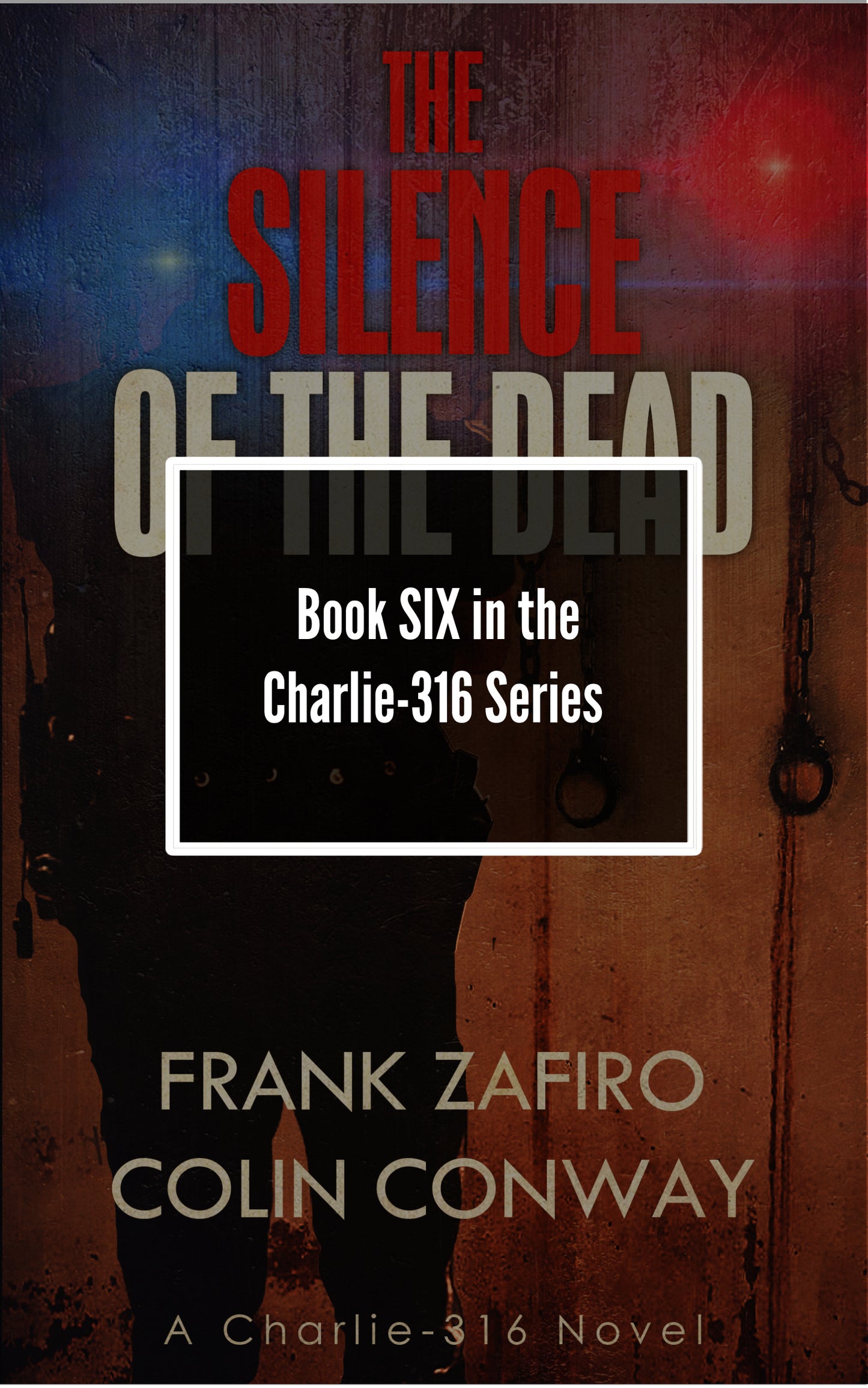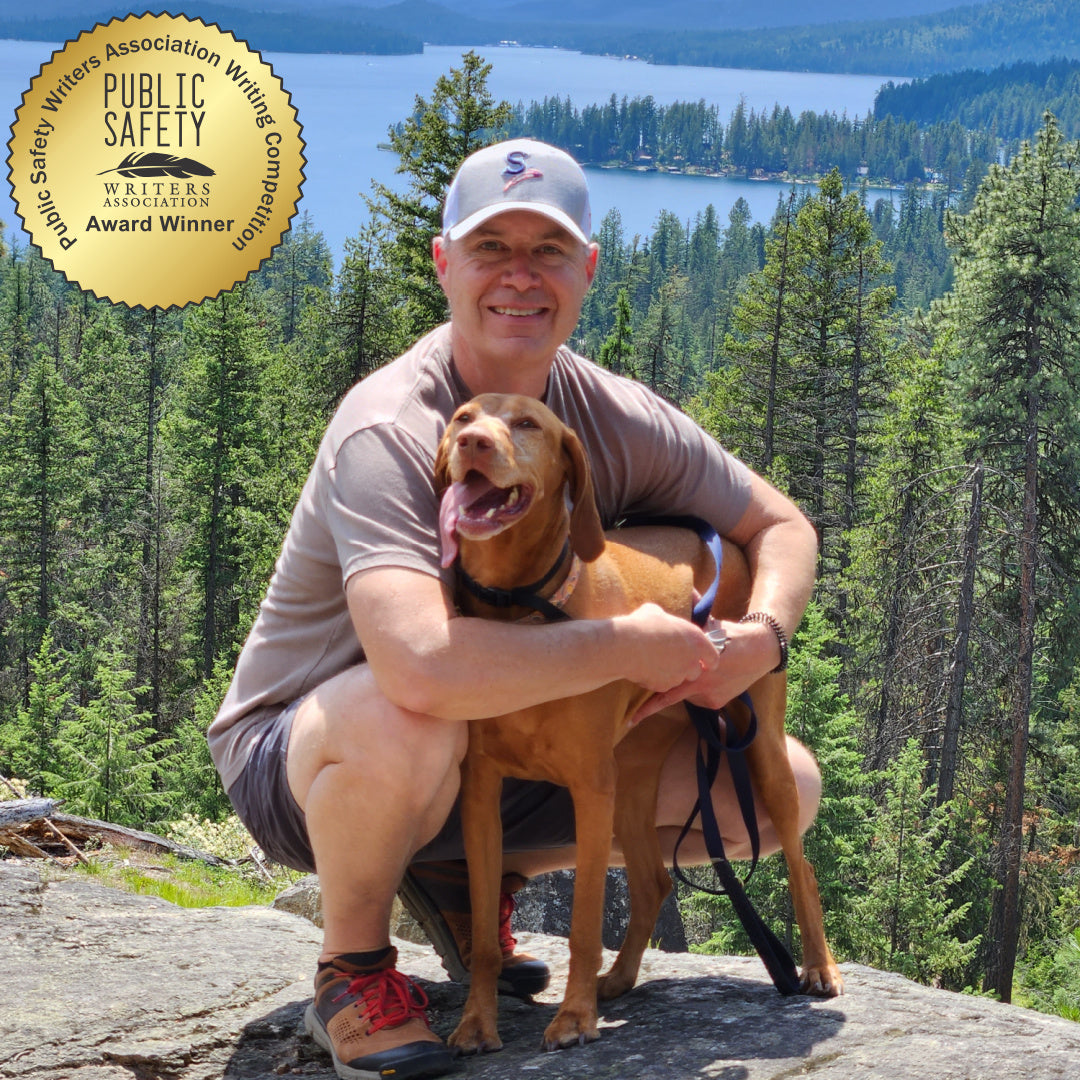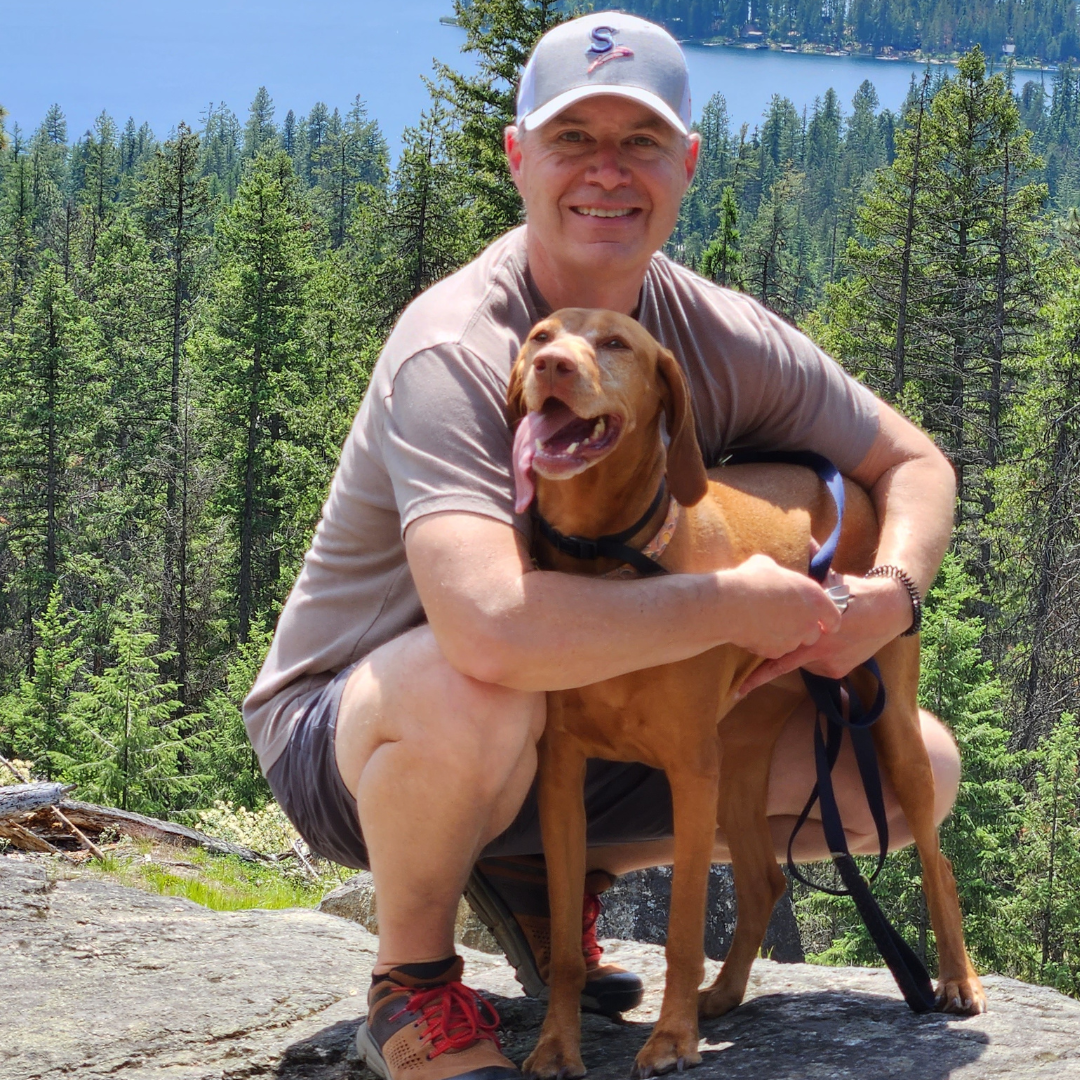Couldn't load pickup availability
The Silence of the Dead (#6) - eBook
The Silence of the Dead (#6) - eBook
Book 6 in the Charlie-316 Series
Every city has secrets. Some are evil.
A killer stalks Spokane, Washington, with his history of victims stretching back fifty years. It seems an unlikely truth, but Major Crimes Detective Wardell Clint is driven to prove it. After discovering tenuous links between many unsolved murders, Clint develops a theory which forces him deeper into the past.
He must wade through generations of cops, witnesses, and survivors to discover a truth hidden behind privilege and cover-ups. His improbable guide on this journey—retired Police Chief Robert Baumgartner—may be his greatest ally or most dangerous opponent.
No matter how long it takes, Clint won’t give up. His job—his duty—is to speak for the dead.
And they’ve been silent for too long.





Read a Sample
The Silence of the Dead (#6) - eBook
Chapter 1
Detective Wardell Clint paused as he settled into a deck chair at former police Chief Robert Baumgartner’s lake house.
“I’m surprised to see you,” Baumgartner said.
Clint narrowed his eyes. “What’s that supposed to mean?”
Baumgartner spread his hands. “Easy. No hidden messages.”
Clint’s stare didn’t relent. He knew better. There were always hidden messages, especially with people like Baumgartner, who, as chief, had spent far more time as a politician than as a cop.
The silence went on longer than it might in any casual encounter. Despite his contempt for the contrived fragility of social conventions, Clint knew how they worked. Silence made people uncomfortable. That made it a useful tool, whether to throw a person off balance or tacitly urge them to fill the quiet by speaking. Often, what was said in those moments could be damning.
Baumgartner, however, matched Clint’s silence, beat for beat.
Darla, the chief’s longtime girlfriend, finally broke the tension when she arrived with a carafe and a pair of coffee cups. If their lack of conversation surprised her, she didn’t show it. She set the container down and slid a cup toward each of them.
“Straight from The Office,” she said lightly. “Our number one blend.”
Clint took a moment to get the reference. Since retiring, Baumgartner had opened a coffee shop called The Chief’s Office. They also served wine and beer in the evening hours. From what Clint had gathered in discussions with others, Baumgartner often spent his days at the business, regaling patrons with stories from his time on the job. Clint figured that was his way of staying in the spotlight. He also believed the chief would much rather be there than sitting with him.
Good. That was one more opportunity to keep the man uncomfortable.
Baumgartner thanked Darla, who bustled away.
When she was out of earshot, Clint said, “I’d have thought you’d marry that one.”
Baumgartner cast a glance after her, then reached up and scratched his face. Clint noticed that he’d lost weight since leaving the job, though he remained heavyset. “I would, but she won’t marry a cop.”
Clint smirked. “You’re no longer on the job.”
“Once it’s in the blood, it doesn’t vanish.”
If that were true, Clint thought, maybe his visit would actually bear fruit.
“What are you doing here, Ward?”
Clint fought the desire to correct Baumgartner’s shortened use of his first name. Baumgartner certainly knew he hated it. At any other time, Clint would have shut down the man immediately. However, he wanted the former chief to think he was getting something over on him. Clint reached into his pocket and removed a digital recorder. He placed it on the table between them and pressed Record. “I am Detective Wardell Clint, Spokane Police Department. I work in the Major Crimes Unit. With me is retired Police Chief Robert Baumgartner. The date is—”
Baumgartner reached out and hit the Stop button. “Quit fucking around and answer my question.”
“I was in the process of doing exactly that.”
“No, you were grandstanding.”
“I don’t grandstand,” Clint scoffed.
“Tell me why you’re here.”
“I’m investigating a homicide.”
“Who’s the victim?”
“Melanie Paz.”
Baumgartner squinted in thought. Finally, he shook his head. “Sounds vaguely familiar.”
“It should. She was murdered in 2016. You were the chief when it happened.”
“I know when I served as chief, Ward.”
“Funny how a murdered girl doesn’t register, though, isn’t it? You must have been busy down at city hall.”
Baumgartner’s brow knitted in a glare. Clint didn’t wither. He had respected Baumgartner’s power as the chief. Truth be told, he’d regarded the man more highly than most of the brass he’d known throughout his career. But despite his large personality, Baumgartner never intimidated him. He wasn’t going to let it start happening now.
“Melanie Paz,” Clint repeated. “Found behind a dumpster on East Sprague, May 18, 2016. Sexually assaulted. Some mutilation. No suspects. Detective Leeanne Hollander assigned. She got nowhere on it. Now I’m working it.”
Baumgartner took in his words with a calculating gaze, then said, “Working cold cases, huh? What’d you do to get booted out of the rotation, Ward?”
Clint seethed at the question and chose to answer indirectly. “Don’t think you know how things work now. You’ve been gone a while.”
“Not that long,” the chief said. He lifted the carafe and poured some coffee into his cup. He glanced up. “Want some?”
Clint ignored the question. “I dug into Paz’s case. There were some elements connecting it to previous unsolved homicides in the cold case files.”
“What a surprise.” Baumgartner set down the carafe. “You’re down a rabbit hole.”
Clint frowned. He knew his reputation around the police department. Some saw him as a crazy, conspiracy-weaving paranoid detective with no social skills. Others saw him as something worse. None of them could deny his clearance rate, which was the highest one in Major Crimes, an objective fact he took a measure of pride in.
At times, his reputation helped him accomplish his goals. Other times, it proved an obstacle. He still wasn’t sure which it would be with Baumgartner.
Clint reached out and pressed the Record button again. “The twenty-sixteen case has some similarities to a homicide investigation you worked in two thousand-five. James Lockett?”
Baumgartner didn’t react.
“When I looked into your oh-five case and did some more cross-referencing, I found similarities between it and two much older homicides deeper down in the vault. One from seventy-four and another from all the way back to 1951. Like Lockett, both were marked as solved.”
“Sounds like you should be interviewing someone from the Law Enforcement Museum and Archives instead of me.”
“Fuck LEMA,” Clint growled. “I’m not looking for whitewashed propaganda. I want the truth.”
“About what?”
“These cases are connected.”
“You said they were all solved.”
“I said they were marked as solved. It’s not the same.”
“Sounds like you’re chasing ghosts again.”
“Forgive me if I trust my insights as a seasoned investigator more than someone who spent the last years of his career playing footsie with politicians.”
Clint was surprised to see Baumgartner’s muted reaction. Back in the day, the chief’s anger was legendary. Now, all Clint got from a direct insult was the slightest tightening around Baumgartner’s eyes and mouth.
“If you don’t value my opinion,” Baumgartner said evenly, “why are you here?”
“I don’t need your opinion,” Clint said. “I need facts. Facts only you know.”
Baumgartner stared at him for a long while. Clint sat and waited, unperturbed. Finally, the chief said, “What cases are we talking about?”
Clint told him. As he spoke, he watched carefully for micro expressions to betray Baumgartner’s true depth of knowledge. What he saw only confirmed what he had long suspected. Baumgartner clearly recalled the investigation he worked with Detective Dusty Maragas, his partner in 2005. Clint also believed the former chief knew about the 1974 case, too. One of the men assigned to that murder had been the much-revered Augustus Salter, as close to Spokane Police royalty as one could get. The man spawned three generations of Salters on SPD.
Salter was Baumgartner’s lieutenant in 2005.
That was a connection.
The 1951 case he dredged up had a more tenuous correlation, Clint had to admit. The two detectives assigned were George Amherst and Walter Pierce. After working that investigation together, Pierce remained on the job for a long career. In 1974, he worked another high-profile homicide—along with Salter—that Clint was certain related to the one in 1951 and the one in 2005.
That made for a direct link in all three cases—Baumgartner back to Salter to Pierce—2005 to 1974 to 1951.
Maybe it was all a coincidence.
Only, Clint didn’t believe in coincidences.
He kept these thoughts to himself when he told Baumgartner about the cases, relating only the dates, victims, and status of each. He let Baumgartner fill in the rest, which he knew the man would do. Baumgartner was smart. More than that, he was cunning. He’d see Clint had discovered the tethers connecting these investigations.
When Clint finished, Baumgartner seemed to consider his words for a brief time. Then he motioned toward the recorder. “I’ll talk to you—unofficially.”
“This is an official investigation.”
“If you want to know what I know, it’ll be off the record.”
“What are you afraid of?” Clint asked. “The truth?”
Baumgartner pointed at the recorder. “Off the record,” he repeated.
“I can get a subpoena,” Clint warned. “Force you to testify.”
“You can,” Baumgartner agreed, “but memory’s a tricky thing, isn’t it?”
Clint scowled. He reached out and snapped off the recorder. “Tell me,” he demanded.
Baumgartner appraised Clint. “Some secrets deserve to be kept, especially since most of these are held by the dead. They’ll remain silent.”
“I turned off the recorder,” said Clint. “What more do you want?”
“Same thing anyone wants after a long, tumultuous career. Peace.”
“What about justice?”
Baumgartner smiled wanly. “There’s a slippery word.”
He shook his head. “You should walk away from this.”
“Why would I do that?”
“Because it’s the smart move. If I tell you what happened—if I tell you everything—you won’t be able to leave it alone. I know you, Ward. I know who you are.” He peered more closely at Clint. “Do you know who you are?”
Clint once more struggled to control the resentment about the shortened use of his first name. “I know myself fine.”
“I wonder.”
“I wonder how they make Twinkies. What’s your point?”
“The point is,” Baumgartner said, “there’s nothing to solve. It’s all done. It’s at rest. You poking around?” He shook his head again. “No good will come from it.”
“I told you, I’m not looking for good. I’m looking for justice.”
“Is that all?”
Clint flexed his jaw and stared back at the former chief.
“Leave it be,” Baumgartner said. “Save your career.”
“My career is my business.” Clint cocked his head. “You seem awfully worried about a little sunshine being cast on these cases. Makes me think I’m right about them.”
Baumgartner watched him in silence for a few moments. “You won’t give up, will you?” he said, though the chief’s tone seemed to Clint more like he was talking to himself.
“It’s not in your nature.”
Clint didn’t bother to answer.
“All right.” Baumgartner picked up the carafe again. “You sure you don’t want some of this? It’s a long story.”
“Fine,” Clint said.
As Baumgartner poured, the two were silent for a few seconds. When the cup was full, Clint reached for it.
“Turn it off, Ward.”
Clint froze. He looked up into Baumgartner’s direct, piercing gaze. His eyes cut to the digital recorder between them. “I already did.”
Baumgartner shook his head. “You’d never give up that easy. You’ve got a backup recorder.”
“Now who’s paranoid?”
“No paranoia. Just a belief that past behavior is the best predictor of future performance.” Baumgartner’s stare did not waver. “Certain habits a man has are unlikely to become more moderate over time.”
“You read that in a leadership book?” Clint snapped.
“Do I have to pat you down?” the chief asked, undeterred. “Make you empty your pockets? We’re not talking until you turn it off.”
Clint stared at him, torn. He didn’t like the thought Baumgartner might outmaneuver him at anything. He wanted—no, he needed to know what the man knew. If getting the information meant compromise, Clint decided it was worth it—in this instance.
As Baumgartner watched, Clint withdrew a second recorder from his pocket. He’d started it rolling before he exited his police car. Now, he set it on the table, next to the first. Very deliberately, he pressed the Stop button. Then he picked up the cup of coffee and took a sip, his eyes never leaving the former chief’s. Only when he’d plunked the mug back onto the table did he ask, “Okay if I take notes, at least?”
Baumgartner shook his head. “Use that vaunted Wardell Clint memory.”
Clint frowned, but he’d already agreed to Baumgartner’s terms. There was no going back now. “Fine,” he said. “Let’s begin.”
The former chief glanced at the morning sun glinting off the lake. “Where do you want to start?” he asked.
“Fifty-one,” Clint said immediately. “Amherst and Pierce.”
Baumgartner nodded slowly. He closed his eyes, as if collecting himself. Then he said, “Okay. Here’s what I know.”

Meet the Author
Colin Conway writes in multiple crime fiction genres including cozy mysteries, police procedural, private detective, amateur sleuth, and thriller. He’s published over thirty books in a variety of series.
If you're a fan of crime fiction novels, we'll have something you'll like.
Colin's love for crime fiction started while serving in the U.S. Army. That’s when he discovered authors likes Lawrence Block, Andrew Vachss, and John D. MacDonald. Colin’s interest in writing developed while working as a police officer in Spokane, Washington.
His creative secret is Rose the Office Dog, his constant companion.




